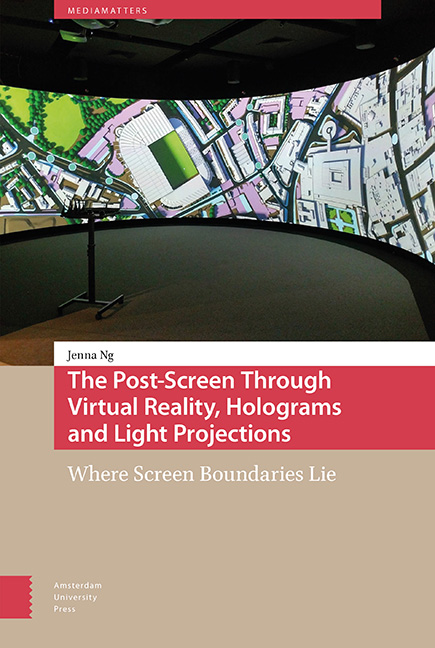 The Post-Screen through Virtual Reality, Holograms and Light Projections
The Post-Screen through Virtual Reality, Holograms and Light Projections Book contents
- Frontmatter
- Dedication
- Table of Contents
- Acknowledgements
- Introduction
- 1 Screen Boundaries as Movement
- 2 Leaking at the Edges
- 3 Virtual Reality: Confinement and Engulfment; Replacement and Re-placement
- 4 Holograms/Holographic Projections : Ghosts Amongst the Living; Ghosts of the Living
- 4A (Remix) True Holograms: A Different Kind of Screen; A Different Kind of Ghost
- 5 Light Projections: On the Matter of Light and the Lightness of Matter
- Conclusion/Coda
- Index
4 - Holograms/Holographic Projections : Ghosts Amongst the Living; Ghosts of the Living
Published online by Cambridge University Press: 16 December 2021
- Frontmatter
- Dedication
- Table of Contents
- Acknowledgements
- Introduction
- 1 Screen Boundaries as Movement
- 2 Leaking at the Edges
- 3 Virtual Reality: Confinement and Engulfment; Replacement and Re-placement
- 4 Holograms/Holographic Projections : Ghosts Amongst the Living; Ghosts of the Living
- 4A (Remix) True Holograms: A Different Kind of Screen; A Different Kind of Ghost
- 5 Light Projections: On the Matter of Light and the Lightness of Matter
- Conclusion/Coda
- Index
Summary
Abstract
This chapter explicates holographic projections as the second instantiation of post-screen media. Often mistaken as holograms, these projections of images ranging from Tupac to Julian Assange to holographic protests redraw the boundaries between life and death, and enable a re-imagination of ghosts, deadness, aliveness and afterlife. The chapter argues for four different moments in a history of ghosts in the media: resurrection; necrophilia; necromancy; and interactivity. The last facilitates spectral life in the post-screen through considering holographic projections of both dead and living figures. In relation to the dead, the post-screen becomes a space in limbo between deadness and aliveness; in relation to the living, the realness of the holographic body stretches in a tetravalence across dual axes of actual/virtual and here/elsewhere, and enlivened in what I call vivification. In these 3D displays on the post-screen of resurrected and vivified bodies, different kinds of life, afterlife and after-death emerge.
Keywords: hologram; holographic projection; death; life; afterlife; ghosts
How We See Ghosts, or, In Love with the Post-Screen
To put it plainly, the man wants to go to bed with a woman who's dead; he is indulging in a form of necrophilia.
∼ Alfred Hitchcock“The man who wants to go to bed with a woman who's dead” is Scottie (played by James Stewart) in Alfred Hitchcock's Vertigo, a film met with mixed reviews on its release, but today consistently ranked amongst the “greatest films of all time.” In the first half of Vertigo, Scottie falls in love with a woman, Madeleine (played by Kim Novak), who then dies, or so he is led to think. In the second half, Scottie meets another woman, Judy (also played by Kim Novak), who looks just like Madeleine. Inevitably, Scottie attempts to recreate Madeleine out of Judy, compelling Judy to change her hair, clothes and shoes to resemble his dead lover. The film does not explicate Scottie's motivations: it seems in part a romantic pining, and in part a kind of pathological desire in his uncompromising demands of Judy to alter her appearance.
- Type
- Chapter
- Information
- The Post-Screen through Virtual Reality, Holograms and Light ProjectionsWhere Screen Boundaries Lie, pp. 155 - 188Publisher: Amsterdam University PressPrint publication year: 2021
